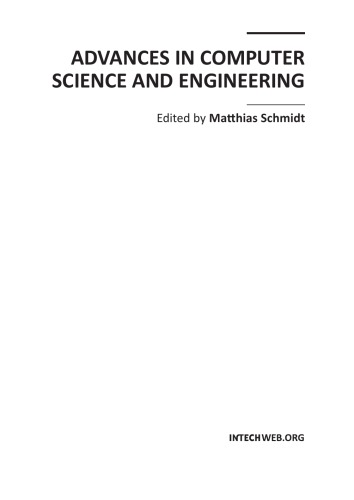

Most ebook files are in PDF format, so you can easily read them using various software such as Foxit Reader or directly on the Google Chrome browser.
Some ebook files are released by publishers in other formats such as .awz, .mobi, .epub, .fb2, etc. You may need to install specific software to read these formats on mobile/PC, such as Calibre.
Please read the tutorial at this link: https://ebookbell.com/faq
We offer FREE conversion to the popular formats you request; however, this may take some time. Therefore, right after payment, please email us, and we will try to provide the service as quickly as possible.
For some exceptional file formats or broken links (if any), please refrain from opening any disputes. Instead, email us first, and we will try to assist within a maximum of 6 hours.
EbookBell Team

4.8
14 reviews 
ISBN 10: 9533071737
ISBN 13: 978-9533071732
Author: Matthias Schmidt
The book Advances in Computer Science and Engineering constitutes the revised selection of 23 chapters written by scientists and researchers from all over the world. The chapters cover topics in the scientific fields of Applied Computing Techniques, Innovations in Mechanical Engineering, Electrical Engineering and Applications and Advances in Applied Modeling.
Next Generation Self-learning Style in Pervasive Computing Environments
Automatic Generation of Programs
Application of Computer Algebra into the Analysis of a Malaria Model using MAPLE
Understanding Virtual Reality Technology: Advances and Applications
Real-Time Cross-Layer Routing Protocol for Ad Hoc Wireless Sensor Networks
Experimental Implementation of Lyapunov based MRAC for Small Biped Robot Mimicking Human Gait
Performance Assessment of Multi-State Systems with Critical Failure Modes: Application to the Flotation Metallic Arsenic Circuit
Object Oriented Modeling of Rotating Electrical Machines
Mathematical Modelling and Simulation of Pneumatic Systems
Longitudinal Vibration of Isotropic Solid Rods: From Classical to Modern Theories
A Multiphysics Analysis of Aluminum Welding Flux Composition Optimization Methods
Estimation of Space Air Change Rates and CO2 Generation Rates for Mechanically-Ventilated Buildings
Decontamination of Solid and Powder Foodstuffs using DIC Technology
Dynamic Analysis of a DC-DC Multiplier Converter
Computation Time Efficient Models of DC-to-DC Converters for Multi-Domain Simulations
How to Prove Period-Doubling Bifurcations Existence for Systems of any Dimension - Applications in Electronics and Thermal Field
Geometry-Induced Transport Properties of Two Dimensional Networks
New Approach to a Tourist Navigation System that Promotes Interaction with Environment
Logistic Operating Curves in Theory and Practice
Lütkenhöner’s „Intensity Dependence of Auditory Responses“: An Instructional Example in How Not To Do Computational Neurobiology
A Warning to the Human-Factors Engineer: False Derivations of Riesz’s Weber Fraction, Piéron’s Law, and Others Within Norwich et al.’s Entropy Theory of Perception
A Model of Adding Relations in Two Levels of a Linking Pin Organization Structure with Two Subordinates
The Multi-Objective Refactoring Set Selection Problem - A Solution Representation Analysis
advances in computer science and engineering
advances in computer science for engineering and education vi
advances in computer science for engineering and education
advances in computer science for engineering and education vii
advanced topics in computer science
Tags: Matthias Schmidt, Advances, Computer, Science, Engineering